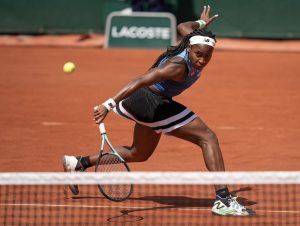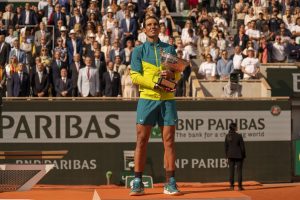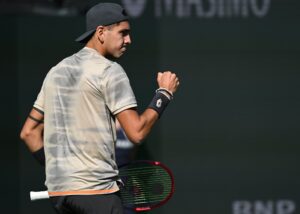Martin Keady, our resident tennis historian, looks back at five of the most memorable French Opens and explains why the 2021 edition should also be unforgettable.
After a European clay-court season that has been doubly enjoyable following the rescheduling or cancellation of most clay-court events last year, the stage is set for the second Major of the year – the French Open. And there is every chance that this year’s tournament will become one of the most historic in the 130 years since the French Championships (as it was called before the Open era) was first played. Either Rafael Nadal will win his 14th French Open title and in the process set a new record of 21 for total Majors won by a man (breaking the tie that he is currently in with Roger Federer) or, after nearly a decade and a half of dominance by the great Spaniard, someone will finally break his stranglehold on Roland Garros.
For now, Nadal remains the overwhelming favourite to retain his French title, because overall he has had a very impressive build-up to Roland Garros. He may have lost early on in Monte Carlo, but he recovered brilliantly to beat Stefanos Tsitsipas (the Monte Carlo Champion) in a truly classic three-set final in Barcelona. Then, after his fairly customary woes in Madrid, where the altitude makes it the fastest clay-court event in the world and therefore ultimately unsuitable for Nadal, he also triumphed in Rome, winning another titanic three-set Final against his greatest rival on clay, Novak Djokovic.
Nevertheless, Nadal’s rivals, including Djokovic, can still take heart. For one thing, whatever happens in Paris, it is surely impossible that Djokovic will have to play two matches the day before he faces Nadal. That was what he had to in Rome, after rain in the Italian capital meant that he had to complete his quarterfinal and play the entire semi-final less than 24 hours before playing Nadal in the Final. So, although Djokovic has not won a clay-court event this year in the run-up to the French Open, he is still the man most likely to give Nadal a run for his money at Roland Garros.
The next most likely contender is the man who won in Monte Carlo and, even more importantly, nearly beat Nadal in Barcelona – Stefanos Tsitsipas. The Greek has done well again this week in Lyon, one of the final warm-up events before the French Open, and looks the best of the younger players to go deep in Paris. However, Andrey Rublev (if he can finally get past the quarterfinal stage at a Major) and perhaps even Jannik Sinner, a quarterfinalist in Paris on his debut last year, might also make a splash, figuratively speaking, on the red dirt. And if Dominic Thiem can somehow get himself fully fit before the tournament starts (a big if after his stuttering performances so far this season), as a US Open Champion and two-time Roland Garros runner-up he definitely has the potential to make another run at the title.
For now, though, Nadal undoubtedly looks like the man to beat, and these previous Paris classics (listed in chronological order) remain the five most memorable French Opens to date.
1.1968: The First French Open
The first French Open was also the first Major of the Open era. The Australian Open, which constantly moved around the calendar during the first three quarters of the 20th century, did not precede it in 1968, so Roland Garros had the honour of staging the first fully professional Grand Slam tournament. And history was made outside Roland Garros, too, as the first ever French Open (the renaming of the tournament reflecting the fact that professionals could now enter it) took place against the backdrop of the May 1968 riots in Paris, which nearly brought France to a standstill.
Somehow the tennis continued and the eventual winners were, on the men’s side, Ken Rosewall, who defeated his fellow Australian Rod Laver in four sets in the Final (6–3, 6–1, 2–6, 6–2), and, on the women’s side, America’s Nancy Richey, who defeated Britain’s Ann Jones, a two-time winner in Paris earlier in the 1960s, in two hard-fought sets and a runaway final set (5–7, 6–4, 6–1). However, the “Major” irony was that although the tournament itself, like the rest of tennis, had finally become professional, Richey herself remained an amateur and so was unable to claim the prize money (5,000 francs) that she had won.
- 1983: Yannick Noah Becomes First Frenchman in 37 Years To Win The French Open
It is another wonderful irony that British tennis, having waited so long (77 years) for a male winner of its home Major, is now the Major that can claim to have had the most recent homegrown male champion. It is only five years since Andy Murray won his second Wimbledon title, whereas the wait for a home male champion at the three other Majors continues: Andy Roddick was the last American man to win the US Open, in 2003 (meaning an 18-year wait since); Mark Edmondson was the last Australian man to win the Australian Open, in 1976 (meaning a 45-year wait since); and Yannick Noah was the last French man to win the French Open, in 1983 (meaning a 38-year wait since).
Of all those home triumphs, Yannick Noah’s was among the most emotional, because it came 37 years after the previous triumph in Paris by a Frenchman – that of Marcel Bernard in 1946, when he defeated the great Jaroslav Drobný in the Final. In addition, it came more than half a century after the great golden age of French tennis, when Les Quatre Musquetaires – Jean Borotra, Jacques Brugnon, Henri Cochet and René Lacoste – made France the greatest tennis nation on earth, collectively winning eight French Opens in a row (between 1925 and 1932) and six successive Davis Cups (between 1927 and 1932).
By contrast, Noah’s 1983 victory in Paris was a glorious one-off that did not lead to a new golden age for French tennis. Nevertheless, it was still a truly historic triumph, not only because he beat the reigning French Open champion Mats Wilander in straight sets ( 6–2, 7–5, 7–6 (7–3)) but because he was the last player, either male or female, to win a Grand Slam tournament with a wooden racket. After Noah, the veritable flood of aluminium and other metallic rackets began, and wooden rackets became a thing of the past.
- 2005: Rafael Nadal Wins His First French Open
Such has been the dominance of The Big Three – although “The GIGANTIC Three” would be a more accurate term for Roger Federer (20 Majors), Rafael Nadal (20 Majors) and Novak Djokovic (18 Majors) – over what is now nearly two decades that it is not surprising that the last three historic French Opens on this list are those in which they won their first French titles.
Rafael Nadal’s reign in Paris, during which time he has become the most successful Spaniard in the French capital since Pablo Picasso nearly a century earlier, began against Argentina’s Mariano Puerta in 2005, with Nadal winning in four sets (6–7 (6–8), 6–3, 6–1, 7–5). Since then, of course, Nadal has won a dozen other French Opens, going on no fewer than three separate winning runs: four titles in a row between 2005 and 2008; five in a row between 2010 and 2014; and, currently, another four in a row since 2017.
Indeed, Nadal’s dominance on the red dirt has been such that he is a legitimate contender to be considered not just the greatest tennis player ever but the greatest sportsman ever. He has only a few rivals for that most astonishing of titles, such as 400 metres hurdler Ed Moses, who went a full decade between 1977 and 1987 without losing a race, and squash player Jahangir Khan, who went for more than five years and 555 games without losing a match, between 1981 and 1986.
As for Puerta, reaching the Final of the French Open was not just his career highlight but effectively the end of his career, as he tested positive for a banned substance (etilefrine) immediately afterwards and subsequently received an eight-year ban from professional tennis.
- 2009: Roger Federer Wins His Only French Open
En route to winning his first French Open in 2005, Nadal beat Roger Federer in the semi-finals. For the next three years after that, Nadal beat Federer in the Final, culminating in his 2008 straight-sets thrashing of the Swiss, which included a third set bagel (or ‘claygel’) (6–1, 6–3, 6–0). So, having lost four times in succession to Nadal in Paris, by 2009 it seemed that Federer might never win the French Open and so would not complete the Career Grand Slam of winning each Major at least once.
Enter Robin Söderling, the last great (or at least nearly great) male Swedish player, who followed in the illustrious footsteps of Borg, Wilander and Edberg, not by winning a Major but by twice reaching the French Open Final. On the first occasion, in 2009, he beat Nadal in the fourth round, stunning the Spaniard and the entire tennis world by winning in four sets (6-2, 6-7 (7-2), 6-4, 7-6 (7-2)). Federer himself almost went out in the fourth round, as his opponent Tommy Haas won the first two sets and even had a match-point against him before he fought back to win in five sets (6-7, 5-7,6-4, 6-0, 6-2). Ultimately, Federer made the most of that reprieve and Nadal’s early exit to go all the way to the Final, in which he beat Söderling in straight sets (6–1, 7–6 (7–1), 6–4), to finally claim the French title that prior to Nadal’s exit had begun to appear an impossible goal.
- 2016: Novak Djokovic Wins His Only French Open (So far!)
In the run-up to this year’s Roland Garros, it was fascinating to hear Guy Forget, the tournament director, say that if Nadal had not existed Roger Federer would have won five or six French Opens. As is often the case, Forget was obviously forgetting Novak Djokovic, who for more than a decade now has been a far greater rival for Nadal than Federer, at all four Majors but in particular on the clay of Paris. Having lost to Nadal in the 2012 and 2014 Finals, and then having suffered a shock defeat in the 2015 Final to Stan Wawrinka, Djokovic finally completed the Career Grand Slam, and his own so-called “Nole Slam” of holding all four Major titles simultaneously (if not in the same calendar year), in 2016.
Such was the scale of Djokovic’s achievement in Paris that year and indeed his all-round dominance in men’s tennis over the previous 12 months that in retrospect it is perhaps not so surprising that he subsequently lost focus for two years, until he finally won another Major again at Wimbledon in 2018. Since then, of course, the Great Serb has almost matched his herculean efforts of 2015-16, going close to winning another “Nole Slam” in 2019, until he was defeated by Dominic Thiem in the Paris semis.
Now, two years and one pandemic on, Djokovic will almost certainly be Nadal’s greatest rival in Paris again. Although he lost both the 2020 French Open Final, played out in the autumn after pandemic rescheduling, and more recently the 2021 Rome Final to Nadal, the suspicion remains that if anyone is to stop Nadal this year it will have to be Djokovic. If he does win, after already winning the Australian Open in February, he would obviously be on course for the calendar Grand Slam – i.e. the actual Grand Slam – that has only ever been won before by Don Budge and Rod Laver (who did it twice, first as an amateur and then as a professional). And if Djokovic achieves that phenomenal feat, then he, and not Nadal, will be the man who makes it “21 (Majors) in ’21”.
Main Photo:






